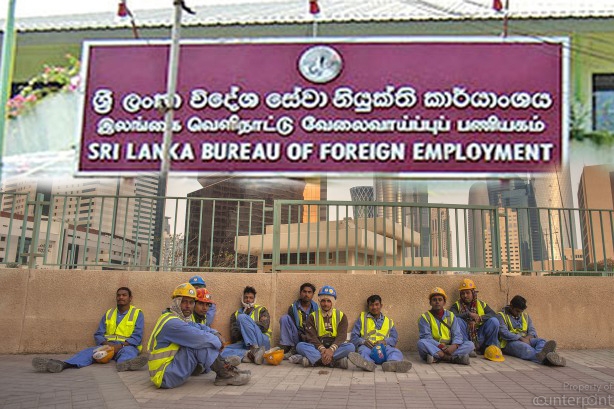Are they victims of circumstances?
Sri Lanka’s migrant workers contributed 6.7 billion US dollars to the country’s purse last year. Annually, more than 200, 000 Sri Lankans go overseas to work.
Their remittances continue to remain the number one source of foreign income for Sri Lanka with more than 50 percent of the market share.
Yet, these workers continue to be maligned. The outbreak of the pandemic appears to have made their situation starker as reports emerge of stranded Sri Lankan workers.
Deputy General Manager of the Sri Lanka Bureau of Foreign Employment Mangala Randeniya refutes the assertion. “The complaints are usually from workers who have become independent and whose employment status has changed”, he points out. What he means by becoming “independent” are those workers who unilaterally end their contracts with the employer for whatever reason. The Bureau will still help them to return to Sri Lanka by paying for their airfare even though their registration with them has lapsed because of the change of status in their employment.
All migrant workers have to register with the SLBFE before they go abroad to start their employment. This is a legal requirement under the Sri Lanka Bureau of Foreign Employment Act 1985. Registration ensures these workers have the Bureau’s protection and benefits such as health insurance and a plane ticket in case of premature return because of issues with the employer.
Nearly 90 percent of migrant workers who are waiting to return to Sri Lanka are those who are registered with the SLBFE.
Since March last year, the Bureau has repatriated about 40, 000 workers. Most are from middle eastern countries, Singapore, Malaysia, Korea and Japan. At the start of the pandemic it repatriated between 200- 250 workers every month but wants to increase these numbers to at least 800. The workers fly back on charter, cargo or special flights or the routine flights that some countries have started to operate even though they are limited in number. After they arrive the workers complete their quarantine in government run facilities before they join their families. The cost of this is borne by the government and is about 60, 000 rupees per person and includes two PCR tests. In the case of workers who have completed their contracts, their employers pay the airfare for the return. Once the workers return to their homes, the Bureau arranges a follow up with them to support them with matters such as self- employment and psychosocial assistance. They also conduct online focus group discussions to help these returnees with their future plans although these days most do not want to go overseas to work.
“I would like to make a request to the independent workers”, says Randeniya. “They should not mislead the Bureau by telling us they will pay for their return but then renege on it and then make a fuss about it because it puts a strain on our resources”.
Last year 220, 000 migrant workers applied to go overseas and about 53, 000 were able to make it to their destination.
By Sarasi wijerathne





